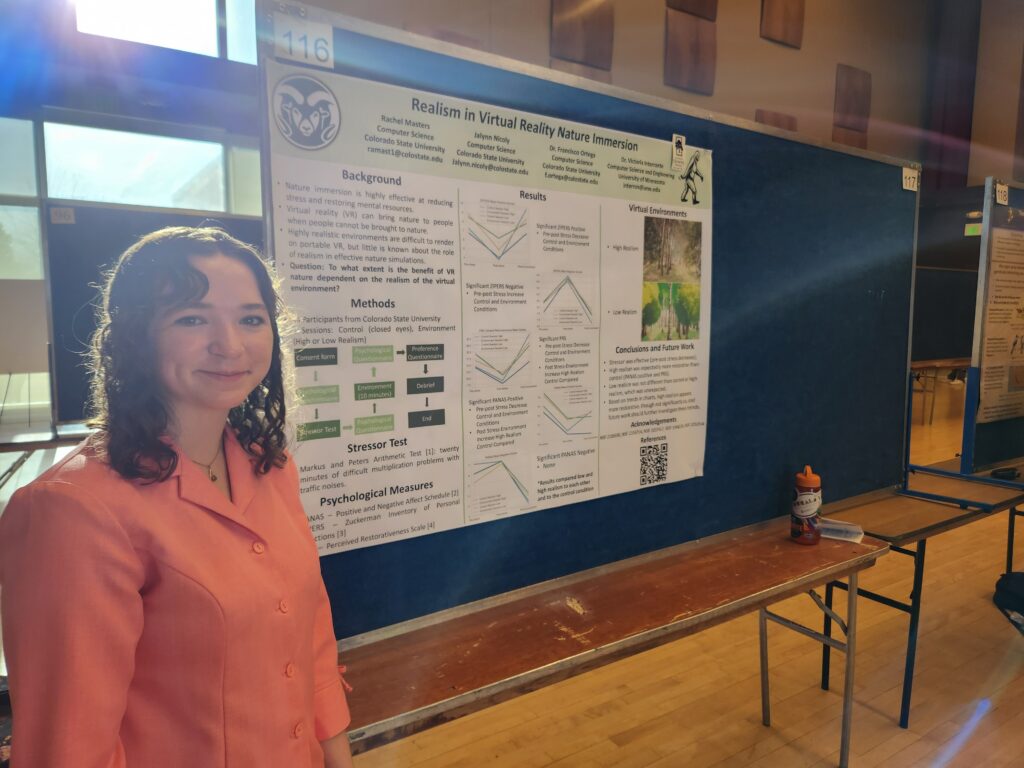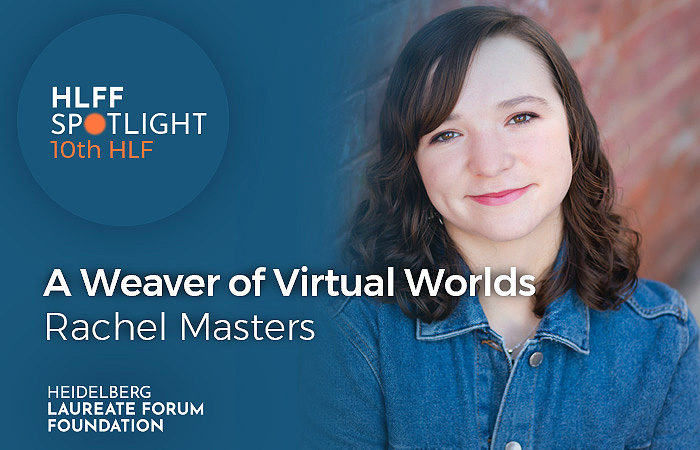HLFF Spotlight: 10th HLF
BLOG: Heidelberg Laureate Forum

A Weaver of Virtual Worlds – Rachel Masters
The Heidelberg Laureate Forum has a single purpose: To provide some of the brightest minds in mathematics and computer science with the space and time to make connections and find inspiration. The HLFF Spotlight series shines a light on some of the brilliant young researchers attending the event, their background and research, as well as their expectations for the HLF.
Hiking and fishing in the Rocky Mountains were part and parcel of 10th HLF attendee Rachel Masters’ childhood. Nowadays, she taps into these experiences while developing the best possible immersive and therapeutic nature-based virtual reality (VR) experiences – forest landscape escapes through which people can take quick mental breaks.
The energetic 23-year-old’s VR-based “forest bathing” project forms part of her PhD studies at Colorado State University (CSU) in the USA. It is funded through a National Science Foundation grant.
Rachel explains the rationale behind her studies as such: “Forest bathing is a therapeutic technique involving immersion in nature to reduce stress and restore mental resources. Unfortunately, it’s not readily available to city dwellers, for instance. They need a uniquely immersive, accessible platform that can provide benefits similar to nature. VR is a promising supplement as a virtual stress relief tool, especially since portable VR headsets are becoming more accessible and affordable.”
Besides programming and designing the virtual landscapes, she will – as part of her PhD studies – test the elements and level of design detail crucial to providing an overwhelmingly relaxing nature-based VR experience that improves someone’s mental health. This will include experimenting with how many different plant species need to be included in a virtual landscape for it to be realistically soothing.
“Since VR cannot fully replicate reality, it is critical to understand the essential components for creating effective virtual nature environments, or VNEs,” adds Rachel. “There are still gaps in the literature and many unanswered questions. We need to understand what is restorative about nature before we can understand what is important when designing VR environments. VR isn’t reality. It operates a little bit differently, and people perceive things in different ways. We need to understand how they understand real nature so that we can translate this to VR and apply it to different populations.”
To this end, she was the lead author of a paper on the topic at the 2022 ACM Symposium on Applied Perception, titled “Virtual Nature: Investigating The Effect of Biomass on Immersive Virtual Reality Forest Bathing Applications For Stress Reduction”.
As part of her PhD research, Rachel will also run experiments to establish the degree to which VR software can help office workers and students destress amid the strains of a working day.
“People often feel burnt out in the middle of the day. Having a ten-minute long recovery experience in your office instead of a power nap could help you push through the rest of the day,” she hopes.
Rachel admits that the biggest challenge so far has been to recruit enough study participants, and to ensure that they remain part of the programme until all data has been collected.
Ideally, this entrepreneur at heart would like to see the VR landscapes she is creating through her PhD become commercially available. She is already one step closer to this dream, after winning the Michael Best Most Promising New Venture Award at her university’s CSU Business Showcase pitch competition.
This star student, who received her undergraduate degree magna cum laude earlier this year, received an honorable mention in the National Center for Women & Information Technology’s Collegiate Awards, and a Goldwater Scholarship in 2022. She also has accolades such as the 2022 Best in Class Intern Award from Hewlett Packard Enterprise at Fort Collins, an Achievement Rewards for College Scientists Scholarship, and a Colorado State University Honors Cilento Scholarship to her name.
Introduction to VR
Rachel was first introduced to the VR field thanks to a hackathon hosted at Colorado State in 2019, during her first year as a computer science student. Her team was tasked with developing a music-based intervention for people suffering from the degenerative brain disorder Alzheimer’s disease.
The challenge spoke to her belief that computer science holds endless possibilities to address or at least alleviate a vast array of problems facing the world and its inhabitants.
“I thought it was super cool, almost like a miracle, to have the opportunity to make an impact on people who live with Alzheimer’s,” remembers Rachel, who has seen the devastating impact that the disease can have on people’s mental capacity.
Importantly, the hackathon introduced her to the research of Francisco Ortega and the Natural User Interaction Lab (NUI) at CSU. She was hooked and left no stone unturned to introduce herself to the man who today is her PhD supervisor.
She has since become a valued member of the NUI Lab, and she has been involved in numerous projects that have subsequently informed her PhD project. For her honours project, for instance, she researched the psychology of drug addiction and the potential use of VR to help people overcome their drug habits.

Other Projects
When not working on her own VR forest bathing ideas, Rachel oversees projects in the NUI Lab on how the aesthetics of a VR nature landscape can help reduce users’ stress levels, especially older people, and how VR can form part of a package of solutions to help people cope with post-traumatic stress disorder (PTSD).
She co-authored a workshop position paper presented at CHI 2023 along with Dr Ortega and Dr Victoria Interrante that advocates for more research to be done on the use of smell and temperature technologies to enhance virtual reality nature immersion.
She is also assisting with a project that looks into the use of augmented reality to improve the training of drone pilots.
“VR can be a great educational tool. It gives you the chance to practice things firsthand, without actually doing it firsthand,” she says.
The 10th HLF
Given her research focus, Rachel would have loved to have made a beeline to an HLF regular, laureate and computer graphics pioneer Ivan Sutherland, come the 10th HLF. Sutherland, who co-designed the first virtual reality headset, the “Sword of Damocles”, in 1968, and won the Turing Award in 1988, will however unfortunately not be able to attend this time round.
“He is an inspiration to the field I am in,” Rachel acknowledges.
She is excited about listening to the laureates as they tell stories about their own contributions, and to learn from them insights on how she too can make the most meaningful contributions to her field.
“I hope to leave inspired by all of the great research going on and take that inspiration back to my own research to help innovate in the field,” adds Rachel, who is looking forward to meeting innovators in computer science and mathematics at the 10th HLF.
“I am especially excited to hear from Whitfield Diffie and Martin Hellman about their work on asymmetric public-key cryptography, as computer security and innovation in secure systems pique my curiosity.”
Creative Side
Rachel describes herself as someone who is “passionately curious” about her research field. However, there’s more to her than just programming, virtual worlds, and screen time. She still prefers an actual nature hike to donning a VR headset.
She’s a hands-on fiber artist who likes crocheting, fiber dyeing, weaving, and felting. She is also a seamstress of note who is not scared to take up the challenge of making or altering a wedding dress or evening gown. The undergraduate business management minor and certificate in entrepreneurship she earned previously come in handy in the management of this sideline business.
All the while, her endeavours are fueled by her personal mission statement: “Strive to exceed your personal best in body and mind.”


